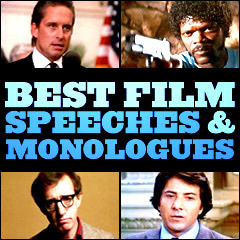|
Best Film Speeches and Monologues
|
|
Title Screen
|
Film Title/Year and Description of Film Speech/Monologue |
Screenshots
|

|
Ali (2001)
Screenwriter(s): Stephen J. Rivele, Christopher Wilkinson, Eric Roth,
Michael Mann
 Draft
Resistance - "You My Opposer" Draft
Resistance - "You My Opposer"
Play clip (excerpt): 
As a conscientious objector, Cassius Clay / Muhammed
Ali (Will Smith) defiantly refused to be drafted and serve
in Vietnam:
I ain't draft dodging. I ain't burning no
flag, and I ain't runnin' to Canada. I'm stayin' right
here. You want to send me to jail? Fine, you go right ahead.
I've been in jail for 400 years. I could be there for four
or five more, but I ain't goin' no 10,000 miles to help
murder and kill other poor people. If I want to die, I'll
die right here, right now, fightin' you, if I want to die. You my
enemy, not no Chinese, no Vietcong, no Japanese. You my
opposer - when I want freedom. You my opposer -
when I want justice. You my opposer - when I want
equality. Want me to go somewhere and fight for you? You
won't even stand up for me right here in America, for my
rights and my religious beliefs. You won't even stand up
for my right here at home.
|

|
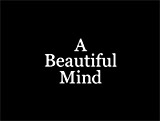
|
A Beautiful Mind (2001)
Screenwriter(s): Akiva Goldsman
 "The
Most Important Discovery of My Life" "The
Most Important Discovery of My Life"
Play clip (excerpt): 
John Nash (Russell Crowe) gave a speech to accept
his Nobel Prize in December 1994
in Stockholm, Sweden, in which he professed his love for his
wife Alicia in the audience:
I've always believed in numbers and the
equations and logics that lead to reason. But after a lifetime
of such pursuits, I ask: 'What truly is logic?' 'Who decides
reason?' My quest has taken me through the physical, the
metaphysical, the delusional -- and back. And I have made
the most important discovery of my career, the most important
discovery of my life: It is only in the mysterious equations
of love that any logic or reasons can be found.
I'm only here tonight because of you [referring
to his wife, Alicia]. You are the reason I am. You
are all my reasons. Thank you.
|
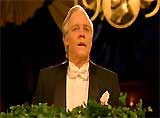
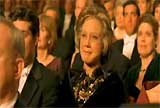
|
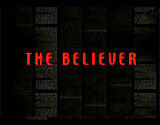
|
The Believer (2001)
Screenwriter(s): Henry Bean
 A
Jew Obsessed With the Jews - An Espousal of Anti-Semitic
Ideology ("Nothingness Without End") A
Jew Obsessed With the Jews - An Espousal of Anti-Semitic
Ideology ("Nothingness Without End")
In a coffee shop in Queens, NY, intense, intolerant
and conflicted 22 year-old Neo-Nazi skinhead Daniel Balint
(Ryan Gosling), an avowed Anti-Semite, agreed to an interview
by tweedy Guy Danielsen (A.D. Miles) of the New York Times,
who asked for Danny to elaborate on his statement that "the
modern world was a Jewish disease."
He began his answer with the statement that "in the movement
-- this racialist movement -- we believe there's a hierarchy
of races. You know, whites at the top, blacks at the bottom,
Asians, Arabs, Latins somewhere in-between."
He felt that
Judaism was "like a sickness"
- and specifically targeted the Jews as poisonous, especially
in regards to their sexuality:
Take sexuality...You ever f--k a Jewish
girl?...Did you ever f--k one?...And? What did you notice?...Jewish
girls like to give head, right?...And Jewish men love to
get it....Yes. It's very pleasurable. But Jews are obsessed
with it. You want to know why?...Because the Jew is essentially
female....Yeah, real men - white, Christian men - we f--k
a woman. We make her come with our cocks. But the Jew doesn't
like to penetrate and thrust - he can't assert himself
in that way, so he resorts to these perversions. Oral sex
is technically a perversion, you know that, right?...So
right after a woman's been with a Jewish man, she's ruined.
She doesn't want to be with a normal partner again... He's
not better. That's not what I said. I said he gives pleasure.
That's actually a weakness...
The Jews clearly control the media and the
banks. Investment banks, not the commercial ones. But the
point is, they carry out in those realms the exact same principles
that they display in sexuality. They undermine traditional
life - and they deracinate society. Deracinate - tear out
the roots. A real people derives its genius from the land:
from the sun, from the sea, from the soil, you know. This
is how they know themselves. But like, Jews don't even have
soil...
Notice the Israelis: it's a fundamentally secular
society. They no longer need Judaism because they have soil,
'cause the real Jew is a wanderer. He's a nomad. He's got
no roots and no attachments. So he 'universalizes' everything.
He can't hammer a nail, or plow a field. All he can do is
buy and sell, and invest capital, manipulate markets, and
you know, it's all mental. He takes a life of a people that's
rooted in soil and then he turns it into this cosmopolitan
culture based on books and numbers and ideas. And you know,
this is his strength.
Take the greatest Jewish minds: Marx, Freud,
Einstein. What have they given us? Communism, infantile sexuality
and the atom bomb. In the mere three centuries it's taken
these people to emerge from the ghettos of Europe, they've
ripped us out a world of order and reason, they've thrown
us into a chaos of class warfare, irrational urges, relativity,
into a world where now the very existence of matter and meaning
is in question. Why? Because it's the deepest impulse of
a Jewish soul to pull at the very fabric of life 'til there's
nothing left but a thread. They want nothing but nothingness.
Nothingness without end.
At the end of the interview, Guy dropped a bombshell
when he outed him as a Jew, asking: "How can you believe
all of this when, when you're a Jew yourself?" He revealed
that he knew that Danny had been bar mitzvahed at Congregation
Ohab Zedek by Rabbi Stanley Nadelman in March, 1988. Objecting
to the alleged discredited and reckless "slander," Danny
pulled out a gun, stuck it in Guy's face, and threatened: "You
put that in the New York Times, Guy, I'm gonna kill
myself." |
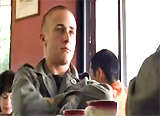
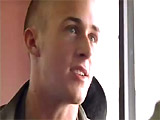
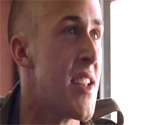
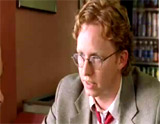
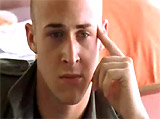
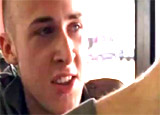
|

|
The Believer (2001)
Screenwriter(s): Henry Bean
 An
Anti-Semitic Rant ("Suffering, It Seems, Is the Very
Crucible of Their Genius") An
Anti-Semitic Rant ("Suffering, It Seems, Is the Very
Crucible of Their Genius")
In front of a small lecture hall, Jewish Neo-Nazi
Daniel Balint (Ryan Gosling) first chanted a Jewish prayer
("Shema yisroel adonai elohenu adonai echod"), and
then began his incendiary talk about how the Jews were willing
victims as the Chosen People:
Let me put it this way: Who wants to destroy
the Jews? Who wants to grind their bones into the dust?
And who wants to see them rise again? Wealthier, more successful,
powerful, cultured, more intelligent than ever? Then you
know what we have to do? We have to love 'em. What? Did
he say 'Love the Jews'? It's strange, I know. But with
these people, nothing is simple.
The Jew says all he wants is to be left alone
to study his Torah, do a little business, fornicate with
his over-sexed wife, but it's not true. He wants to be hated.
He longs for our scorn. He clings to it, as if it were the
very core of his being. If Hitler had not existed, the Jews
would've invented him. For without such hatred, the so-called
Chosen People would vanish from the earth. And this reveals
a terrible truth and really the crux of our problem as Nazis.
The worse the Jews are treated, the stronger they become.
Egyptian slavery made them a nation. The pogroms hardened
them. Auschwitz gave birth to the state of Israel. Suffering,
it seems, is the very crucible of their genius.
So, if the Jews are, as one of their own has
said, a people who will not take 'yes' for an answer, let
us say 'yes' to them. They thrive on opposition. Let us cease
to oppose them. The only way to annihilate this insidious
people once and for all is to open our arms, invite them
into our homes, and embrace them. Only then will they vanish
into assimilation, normality and love. But we cannot pretend.
The Jew is nothing if not clever. He will see through hypocrisy
and condescension. To destroy him, we must love him sincerely.
From the audience, Guy Danielsen (A.D. Miles)
of the Times asked:
If the Jews are strengthened by hate, then
wouldn't this destruction that you speak of - whether it's
by love or any other means - wouldn't that make them more
powerful than they are already?
Daniel responded:
Yes, infinitely more. They would become
as God. It's the Jews' destiny to be annihilated so they
can be deified. Jesus understood this perfectly. And look
what was accomplished there with the death of just one
enlightened Jew. Imagine what would happen if we killed
them all. So, let us say together... Shema yisroel...
|

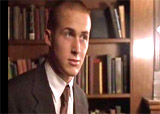
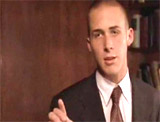
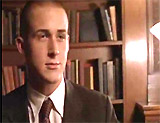
|
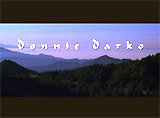
|
Donnie Darko (2001)
Screenwriter(s): Richard Kelly
 The
Asexuality of Smurfs The
Asexuality of Smurfs
Disturbed, but intelligent teenager Donnie Darko
(Jake Gyllenhall) vigorously and drunkenly discussed the sex
habits of animated Smurf characters,
correcting his friends' wrong facts about them:
Smurfette doesn't f--k...First of all, Papa
Smurf didn't create Smurfette. Gargamel did. She was sent
in as Gargamel's evil spy with the intention of destroying
the Smurf village. But the overwhelming goodness of the
Smurf way of life transformed her. And as for the whole
gang-bang scenario, it just couldn't happen. Smurfs are
asexual. They don't even have reproductive organs under
those little white pants. It's just so illogical, you know,
about being a Smurf. You know, what's the point of living
if you don't have a d--k?
|
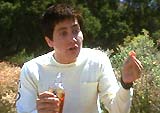
|
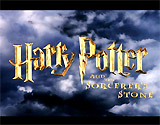
|
Harry
Potter and the Sorcerer's Stone (2001)
Screenwriter(s): Steve Kloves
 "I
Can Tell You How to Bottle Fame, Brew Glory, and Even Put
a Stopper in Death" "I
Can Tell You How to Bottle Fame, Brew Glory, and Even Put
a Stopper in Death"
Devious Professor Severus Snape (Alan Rickman),
during his first Potions class, ominously instructed his Hogwarts
School of Witchcraft and Wizardry students. He picked on 'the
boy who lived' Harry Potter (Daniel Radcliffe), calling him "our
new celebrity," and then provokingly questioned him to
embarrass and belittle him:
There will be no foolish wand-waving or silly
incantations in this class. As such, I don't expect many
of you to appreciate the subtle science and exact art that
is potion-making. However, for those select few who possess
the predisposition, I can teach you how to bewitch the
mind and ensnare the senses. I can tell you how to bottle
fame, brew glory, and even put a stopper in death. Then
again, maybe some of you have come to Hogwarts in possession
of abilities so formidable that you feel confident enough
to not pay attention! Mr. Potter. Our new celebrity.
Tell me, what would I get if I added powdered
root of asphodel to an infusion of wormwood? You don't know?
Well, let's try again. Where, Mr. Potter, would you look
if I asked you to find me a bezoar?...And what is the difference
between monkshood and wolfsbane?...Pity. Clearly, fame isn't
everything, is it, Mr. Potter?
|
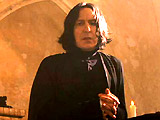
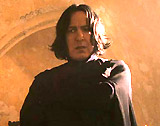
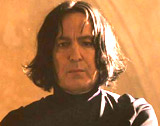
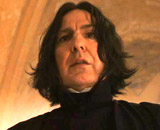
|

|
Iris (2001)
Screenwriter(s): Richard Eyre, Charles Wood
 The
Importance of Education The
Importance of Education
In the film's opening, Irish novelist Dame Iris
Murdoch (Judi Dench), a distinguished graduate and Honorary
Fellow of Oxford University, delivered a dinner speech on the
importance of education, after being introduced and compared
to a "fine vintage claret":
Education doesn't make you happy. And nor
does freedom? We don't become happy just because we're
free, if we are. Or because we've been educated, if we
have. But because education may be the means by which we
realize we are happy. It opens our eyes, our ears. Tells
us where delights are lurking. Convinces us that there
is only one freedom of any importance whatsoever: that
of the mind. And gives us the assurance, the confidence,
to walk the path our mind, our educated mind, offers.
|

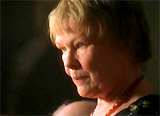
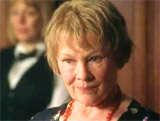
|

|
Legally Blonde (2001)
Screenwriter(s): Karen McCullah Lutz, Kirsten Smith
 "Have
Faith in Yourself" "Have
Faith in Yourself"
Play clip (excerpt): 
In the film's epilogue, Harvard Law School's
2004 graduation ceremony was capped by
the delivery of a short speech by class-elected speaker and
blonde high-honors graduate Elle Woods (Reese Witherspoon):
On our very first day at Harvard, a very
wise Professor quoted Aristotle: 'The law is reason free
from passion.' Well, no offense to Aristotle, but in my
three years at Harvard, I have come to find that passion
is a key ingredient to the study and practice of law -
and of life. It is with passion, courage of conviction,
and strong sense of self that we take our next steps into
the world, remembering that first impressions are not always
correct. You must always have faith in people. And most
importantly, you must always have faith in yourself. Congratulations
Class of 2004, we did it!
|

|
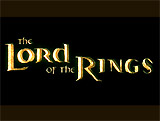
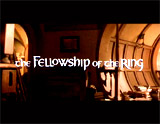
|
The
Lord of the Rings: The Fellowship of the Ring (2001)
Screenwriter(s): Fran Walsh, Philippa Boyens, Peter Jackson
 "One
Ring To Rule Them All" "One
Ring To Rule Them All"
Play clip (excerpt): 
In the opening voice-over prologue, elf Galadriel
(Cate Blanchett) explained the legend of the Ring, created
by Dark Lord Sauron, who lost the "One Ring" during
the battles of Middle-Earth. The Ring was claimed by the creature
Gollum for a long while, until it then "abandoned" him
and came into the possession of hobbit Bilbo Baggins' (Ian
Holm) in the Shire:
The world is changed. I feel it in the water.
I feel it in the earth. I smell it in the air. Much that
once was is lost, for none now live who remember it. It
began with the forging of the Great Rings. Three were given
to the Elves; immortal, wisest and fairest of all beings.
Seven to the Dwarf Lords, great miners and craftsmen of
the mountain halls. And nine, nine rings were gifted to
the race of Men, who above all else desire power. For within
these rings was bound the strength and will to govern each
race. But they were all of them deceived, for another ring
was made. In the land of Mordor, in the fires of Mount
Doom, the Dark Lord Sauron forged, in secret, a master
ring to control all others. And into this ring he poured
his cruelty, his malice and his will to dominate all life.
One ring to rule them all.
One by one, the Free Lands of Middle-Earth
fell to the power of the Ring. But there were some who resisted.
A last alliance of men and elves marched against the armies
of Mordor. And on the slopes of Mount Doom, they fought for
the freedom of Middle-Earth. Victory was near, but the power
of the ring could not be undone. It was in this moment, when
all hope had faded, that Isildur, son of the king, took up
his father's sword. And Sauron, enemy of the free peoples
of Middle-Earth, was defeated. The Ring passed to Isildur,
who had this one chance to destroy evil forever, but the
hearts of men are easily corrupted. And the ring of power
has a will of its own. It betrayed Isildur, to his death.
And some things that should not have been forgotten
were lost. History became legend. Legend became myth. And
for two and a half thousand years, the ring passed out of
all knowledge. Until, when chance came, it ensnared a new
bearer. The ring came to the creature Gollum, who took it
deep into the tunnels of the Misty Mountains. And there it
consumed him. The ring brought to Gollum unnatural long life.
For 500 years, it poisoned his mind. And in the gloom of
Gollum's cave, it waited. Darkness crept back into the forests
of the world. Rumor grew of a shadow in the East - whispers
of a nameless fear. And the Ring of Power perceived its time
had now come. It abandoned Gollum. But something happened
then the Ring did not intend. It was picked up by the most
unlikely creature imaginable. A hobbit, Bilbo Baggins of
the Shire. For the time will soon come when hobbits will
shape the fortunes of all...
|
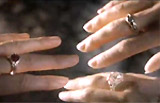
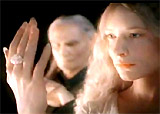
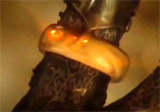
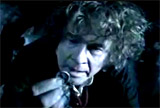
|
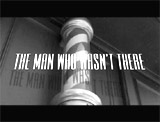
|
The Man Who Wasn't There (2001)
Screenwriter(s): Joel Coen, Ethan Coen
 The
Uncertainty Principle The
Uncertainty Principle
Sharply-dressed, expensive Sacramento defense
attorney Freddy Riedenschneider (Tony Shalhoub) proposed to
his clients, Ed and Doris Crane (Billy Bob Thornton and Frances
McDormand) a winning strategy, Heisenberg's "the uncertainty
principle":
They got this guy, in Germany. Fritz Something-or-other.
Or is it? Maybe it's Werner. Anyway. He's got this theory.
You wanna test something, you know, scientifically. How the
planets go around the sun, what sunspots are made of, why
the water comes out of the tap - well, you gotta look at
it. But sometimes you look at it, your looking changes it.
You can't know the reality of what happened, or what would've
happened if you hadn't a stuck in your own goddamn schnozz.
So there is no 'what happened'? Looking at something
changes it. They call it the 'Uncertainty Principle'.
I'm sure it sounds screwy, but even Einstein says the guy's
on to something. Science, perception, reality, doubt. Reasonable
doubt. I'm sayin' that sometimes the more you look, the less
you really know. It's a fact, true fact. In a way, it's the
only fact there is. This heinie even wrote it out in numbers.
|


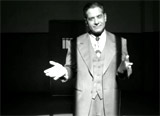
|
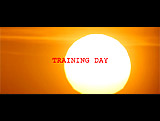
|
Training Day (2001)
Screenwriter(s): David Ayer
 "King
Kong Ain't Got S--t on Me!" "King
Kong Ain't Got S--t on Me!"
Hardened and corrupt Detective Sergeant Alonzo
Harris (Denzel Washington) claimed to neighborhood gang members
while surrounded in the street:
Awwww, you motherf--kers. Okay. Alright.
I'm putting cases on all of you bitches! Huh. You think
you can do this s--t. Jake! You think you can do this to
me?! You motherf--kers will be playin' basketball in Pelican
Bay when I get finished with you! SHU program, n---a. 23
hour lockdown! I'm the man up in this piece! You'll never
see the light of - who the f--k do you think you're f--kin'
with? I'm the police, I run s--t here. You just live here!
Yeah, that's right, you better walk away! Go on and walk
away, 'cause I'm gonna burn this motherf--ker down. King
Kong ain't got s--t on me!
That's right, that's right. S--t, I don't f--k.
I'm winnin' anyway, I'm winnin.' I'm winnin' any motherf--kin'
way, I can't lose. S--t, you can shoot me, but you can't
kill me.
When shot in the ass and then deserted by his
wised-up partner Jake Hoyt (Ethan Hawke), Alonzo delivered
his final words in the film while lighting up a smoke: "Oh,
what a day. What a motherf--kin' day" - shortly afterwards,
his car was surrounded by hooded members of the Russian Mafia
with machine guns - who pulverized his flailing body up against
his car with an incredible volley of gunfire. |


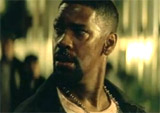
|
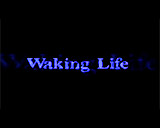
|
Waking Life (2001)
Screenwriter(s): Richard Linklater
In this contemplative, existential experimental
film, The Dreamer (Wiley Wiggins) encountered various individuals
during a dream state, and listened to their philosophies
of life.
 "You
Want to Go With the Flow" "You
Want to Go With the Flow"
He was given a ride by a Boat Car Guy (Bill Wise),
driving a boat/car combination, who explained:
Anchors aweigh! So what do you think of my
little vessel? She's what we call a see-worthy. S-E-E,
see with your eyes. I feel like my transport should be
an extension of my personality. Voila. And this, this is
like my little window to the world, and every minute's
a different show. Now I may not understand it. I may not
even necessarily agree with it. But I'll tell you what,
I accept it and just sort of glide along. You want to keep
things on an even keel, I guess is what I'm saying. You
want to go with the flow. The sea refuses no river. The
idea is to remain in a state of constant departure while
always arriving. It saves on introductions and goodbyes.
The ride does not require an explanation -
just occupants. That's where you guys come in. It's like
you come onto this planet with a crayon box. Now you may
get the eight-pack, you may get the sixteen-pack, but it's
all in what you do with the crayons, the colors, that you're
given. And don't worry about drawing within the lines or
coloring outside the lines. I say color outside the lines,
you know what I mean? Color right off the page. Don't box
me in! We're in motion to the ocean. We are not land-locked,
I'll tell you that. So where do you want out?
|


|

|
Waking Life (2001)
Screenwriter(s): Richard Linklater
 "What
You Do Makes A Difference...It's Always Our Decision Who
We Are" "What
You Do Makes A Difference...It's Always Our Decision Who
We Are"
The Dreamer (Wiley Wiggins) then listened to
a lecture from a Philosophy Professor (Robert C. Solomon),
and afterwards as he continued their discussion on existentialism,
they walked along and went to a coffee shop:
The reason why I refuse to take existentialism
as just another French fashion or historical curiosity,
is that I think it has something very important to offer
us for the new century. I'm afraid we're losing the real
virtues of living life passionately in the sense of taking
responsibility for who you are, the ability to make something
of yourself and feeling good about life. Existentialism
is often discussed as if it's a philosophy of despair,
but I think the truth is just the opposite. Sartre once
interviewed said, he never really felt a day of despair
in his life. But one thing that comes out from reading
these guys is not a sense of anguish about life so much
as a real kind of exuberance, a feeling on top of it. It's
like your life is yours to create.
I've read the post-modernists with some interest,
even admiration, but when I read them I always have this
awful nagging feeling that something absolutely essential
is getting left out. The more that you talk about a person
as a social construction, or as a confluence of forces, or
as fragmented or marginalized, what you do is you open up
a whole new world of excuses. And when Sartre talks about
responsibility, he's not talking about something abstract.
He's not talking about the kind of self or soul that theologians
would argue about. It's something very concrete. It's you
and me talking, making decisions, doing things, and taking
the consequences.
It might be true that there are six billion
people in the world, and counting. Nevertheless - what you
do makes a difference. It makes a difference, first of all,
in material terms. It makes a difference to other people,
and it sets an example. And in short, I think the message
here is that we should never simply write ourselves off and
see ourselves as the victim of various forces. It's always
our decision who we are.
|
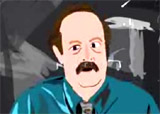
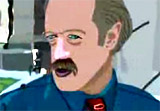
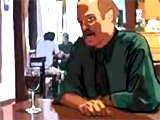
|

|
Waking Life (2001)
Screenwriter(s): Richard Linklater
 "I
Want Real Human Moments" "I
Want Real Human Moments"
The Dreamer (Wiley Wiggins) literally bumped
into red-haired Soap Opera Woman (Tiana Hux) when they collided
on a stairway. She then explained her need for human interaction,
jostling the Dreamer's thinking, who admitted he was "on
zombie auto-pilot lately":
Hey, could we do that again? I know we haven't
met, but, I don't wanna be an ant, ya know? I mean, it's
like we go through life with our antennas bouncing off
one another continuously on 'ant auto-pilot' with nothing
really human required of us. 'Stop,' 'Go,' 'Walk
here,' 'Drive there.' All action basically for survival.
All communication simply to keep this ant colony buzzing
along in an efficient, polite manner. 'Here's your change,'
'Paper or plastic?', 'Credit or debit?', 'Do you want ketchup
with that?' I don't want a straw. I want real human moments.
I want to see you. I want you to see me. I don't want to
give that up. I don't want to be an ant. Ya know?...
|
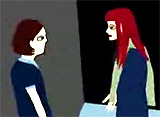

|

|
Waking Life (2001)
Screenwriter(s): Richard Linklater
 The
Ongoing WOW - "We Are the Authors of Ourselves...Life
Understood Is Life Lived" The
Ongoing WOW - "We Are the Authors of Ourselves...Life
Understood Is Life Lived"
Standing on the Brooklyn Bridge, Timothy 'Speed'
Levitch (as Himself) offered rambling, excited thoughts about
existence to the Dreamer (Wiley Wiggins):
On this bridge, Lorca warns: Life is not
a dream. Beware, and beware, and beware. And so many think
because then happened, now isn't. But didn't
I mention? The ongoing WOW is
happening, right now! We are all co-authors of
this dancing exuberance, for even our inabilities are having
a roast. We are the authors of ourselves, co-authoring
a gigantic Dostoevsky novel starring clowns! This entire
thing we're involved with, called the world, is an opportunity
to exhibit how exciting alienation can be. Life is a matter
of a miracle that is collected over time by moments flabbergasted
to be in each others' presence. The world is an exam, to
see if we can rise into the direct experiences. Our eyesight
is here as a test, to see if we can see beyond it, matter
is here as a test for our curiosity, doubt is here as an
exam for our vitality. Thomas Mann wrote that he would
rather participate in life than write a hundred stories.
Giacometti was once run down by a car, and he recalled
falling into a lucid faint, a sudden exhilaration, as he
realized at last, something was happening to him.
An assumption developed that you cannot understand
life and live life simultaneously. I do not agree entirely,
which is to say, I do not exactly disagree. I would say that
life understood is life lived. But, the paradoxes
bug me, and I can learn to love and make love to the paradoxes
that bug me, and on really romantic evenings of self, I go
salsa dancing with my confusion. Before you drift off, don't
forget, which is to say remember, because remembering is
so much more a psychotic activity than forgetting. Lorca,
in that same poem said that the Iguana will bite those who
do not dream, and as one realizes that one is a dream-figure
in another person's dream - That is self-awareness!
|
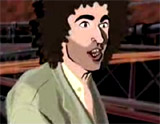
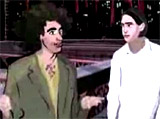
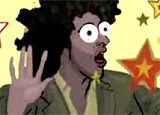
|

|
Waking Life (2001)
Screenwriter(s): Richard Linklater
 "Moving
From the 'No' to the 'Yes'" "Moving
From the 'No' to the 'Yes'"
At the end of the film, the Pinball Playing Man
(director Richard Linklater) gave a long description of existence
to the Dreamer (Wiley Wiggins), who had asserted: "I'm
starting to think that I'm dead." He described a dream
he once had after he had read an essay by science-fiction writer
Philip K. Dick, who had a theory that time was an illusion.
Dick believed that we were all actually living in 50 A.D. -
an illusion to make us forget that God was imminent:
...And that's what time is. That's what all
of history is, this kind of continuous, you know, daydream
or distraction. And so I read that, and I was like, 'Well,
that's weird.' And then that night, I had a dream, and
there was this guy in the dream who was supposed to be
a psychic. But I was skeptical. I was like, 'He's not really
a psychic' I was just thinking to myself. And then suddenly,
I start floating, like levitating up to the ceiling. And
as I almost go through the roof, I'm like, 'OK, Mr. Psychic,
I believe you. You're a psychic. Put me down, please.'
And I float down, and as my feet touch the ground, the
psychic turns into this woman in a green dress. And this
woman is Lady Gregory. Now, Lady Gregory was Yeats' patron,
this, you know, Irish person. And though I'd never seen
her image, I was just sure that this was the face of Lady
Gregory. So we're walking along, and Lady Gregory turns
to me and says, 'Let me explain to you the nature of the
universe.' Now, Philip K. Dick is right about time, but
he's wrong that it's 50 A.D.
Actually, there's only one instant, and it's
right now, and it's eternity. And it's an instant in which
God is posing a question, and that question is basically,
'Do you wanna, you know, be one with eternity, do you want
to be in heaven?' And, we're all saying, 'Nooo thank you,
not just yet.' And so time is actually just this constant
saying 'No' to God's invitation. I mean, that's what time
is. I mean, and it's no more 50 A.D. than it's 2001, you
know? I mean, there's just this one instant, and that's what
we're always in. And then she tells me that actually this
is the narrative of everyone's life. That, you know, behind
the phenomenal difference there is but one story, and that's
the story of moving from the 'No' to the 'Yes.' All of life
is like, 'No thank you, No thank you, No thank you.' And
then, ultimately, it's, 'Yes I give in, Yes I accept, Yes
I embrace.' I mean, that's the journey. Everyone gets to
the 'Yes' in the end, right?
So we continued walking, and uh, my dog runs
over to me. And so I'm petting him. I'm really happy to see
him, you know. He's been dead for years. So I'm petting him
and then I realize there's this kind of gross oozing stuff
coming out of his stomach. And I look over at Lady Gregory,
and she sort of coughs. She's like, 'Oh, excuse me.' And
there's vomit like dribbling down her chin, and it smells
really bad. And I think, 'Well, wait a second. That's not
just the smell of vomit' which is, doesn't smell very good.
'That's the smell of dead person vomit. You know, it's, like,
doubly foul.' And then I realized I'm actually in, you know,
the land of the dead. And everyone around me was dead. My
dog had been dead over ten years. Lady Gregory had been dead
a lot longer than that. When I finally woke up, I was like,
'Whoa. That wasn't a dream. That was a visitation to this
real place, the land of the dead.'...Oh, man. It was just
like one of those, like, life-altering experiences. I mean,
I could never really look at the world the same way again
after that.
The Dreamer also complained about feeling trapped
in his own dream:
I mean, how did you, how did you finally
get out of the dream? See, that's my problem. I'm like
I'm trapped. I keep, I keep thinking that I'm waking up,
but I'm still in a dream. It seems like it's going on forever.
I can't get out of it. I wanna wake up for real. How do
you really wake up?
The film concluded with the Pinball Playing Man's
final advice, the last spoken lines of the film:
I don't know. I don't know. I'm not very
good at that anymore. But, um, if that's what you're thinkin',
I mean, you probably should. I mean, you know, if you can
wake up, you should, because, you know, some day, you know,
you won't be able to, so, just, uhm, but it's easy, you
know - just, just wake up.
The Dreamer woke up, walked outside, and suddenly
floated into the air until he was only a tiny speck far up
in the sky. |

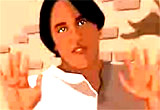
|
